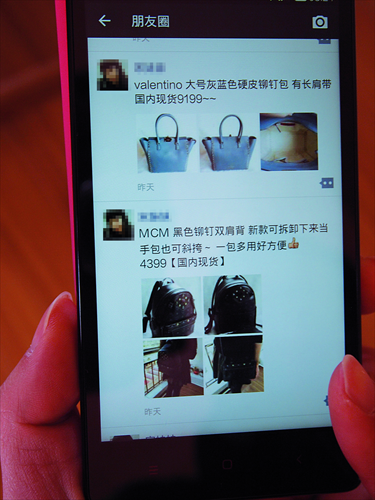HOME >> METRO SHANGHAI
The perils of phone shopping
By Ni Dandan Source:Global Times Published: 2015-3-24 17:38:01
New retail platform app comes with promises and problems

Weidian has been becoming the thriving new player in the Chinese e-commerce market. Photo: CFP
A 36-year-old woman appeared in court in Hangzhou last month, charged with selling items with fake brand certificates. She said she had no idea she was committing a crime - she was just doing business, like hundreds of others, on WeChat Moments (in Chinese this is known as pengyou quan, Friends' Circle).
The woman, surnamed He, had been selling "luxury" handbags on WeChat Moments. She wasn't charging more than a few hundred yuan for these brand handbags so most people would be aware she was not a legitimate franchise for the brand.
Running two WeChat accounts simultaneously the woman regularly posted details of the handbags and when anyone said they wanted to buy one, she ordered the bag from her supplier.
Business boomed and she began selling her handbags full time. Within a few months, she saw her sales turnover pass 110,000 yuan ($17,702). Eventually, however the Hangzhou police were tipped off and arrested the woman seizing her knockoff handbags and watches. She could face up to three years in prison.
Since China's largest online shopping platform, Taobao, started to seriously crack down on knockoff goods four years ago, some retailers have been searching for other platforms to distribute products. With the growing popularity of WeChat and its Moments, Weidian, "virtual" shops run on mobile phones that combine social networking and shopping have become the targets of wheeler dealers. At the end of January this year, more than 70 Weidian facilitators and apps had been established for people wanting their own mobile phone shopping platforms.
A report, "2014 WeChat Moments Marketing Status," compiled by a third-party WeChat facilitator, showed that in the past year, the average monthly turnover for a business run in Moments stood at 94,989 yuan. More than half of those involved were earning more than 10,000 yuan a month.
Thriving business
However this thriving new business format has problems. The case with the fake handbag dealer shows how knockoff traders can easily be involved but there are other dodgy practices. Some Weidian shop owners advertise themselves as purchasing agents and sell luxury brand goods for just slightly less than they cost in domestic shopping malls. There is no guarantee that these are not fakes. And the lack of after sales service and excessive advertising in Moments have all been bothering consumers.
After weighing the pros and cons of traditional physical stores, established online shopping platforms, and Weidian phone shops, Louis Lu decided to launch his cosmetics brand on a Weidian last November.
The decision apparently had a lot to do with the convenience and zero cost of opening business this way. "I only need my ID card to register a Weidian. The whole procedure took less than a minute. There were no fees. Of course, there is no entry fee on Taobao either but Taobao's reputation has been damaged by too many knockoffs and unethical deals over the past few years."
Another Weidian owner, John Jiang, who sells camping and sports equipment, said he had done his figures and decided to shift the focus of his business from his shop in the Jingdong Mall, one of the giant business-to-consumer e-commerce sites in China, to his Weidian in July last year. "The cost of running a shop on a traditional online shopping platform like Jingdong or Tmall has been going up all the time. It took on average 35 yuan to acquire an order from a consumer, but with my Weidian, I can bring the cost down to about 5 yuan."
According to Jiang, the expense of marketing on a traditional online shopping platform costs a significant amount of money. But a Weidian business usually relies on WeChat, Weibo, mobile phone QQ or other social networking apps to market products.
"The efficiency of running promotions on mobile social networking apps has helped advance Weidian businesses rapidly. Also, importantly, businesses can get an instant response from clients," explained Mo Daiqing, an analyst with China e-Business Research Center.
Rapid growth
Although the new business format has seen a rapid growth and been very popular in the domestic market, Mo said it was still at an early stage. Some Weidian businesses today operate simply as WeChat accounts. There isn't even a virtual shop there. But as the market has grown quickly, many companies have sensed the business opportunities and started to either develop apps for businesses to set up virtual shops or provide relevant services.
Mo said that with the emergence of such platforms, Weidian businesses will become better regulated and consumers' rights will be more protected. "At least consumers will have a channel to file complaints. There's basically no guarantees for consumers if they do deals with individual Weidian owners who aren't registered with platforms. But because this is just the start of these Weidian platforms, it's very hard to tell the quality of their service or how effectively consumers' complaints might be handled."
Lu admitted he hasn't hired anyone to provide after sales service. "I haven't thought of the possibility of any consumer complaints because I have total confidence in my products. But it's true that for Weidian owners, whether they are individuals or on a platform, if they encounter problems or difficult customers the easiest and simplest way to 'solve' the problem is by just shutting down the business. It won't take them long to set up a new account."
As his business has picked up, Jiang said he now had one staff member online during the day to handle customers' queries. "But, so far, no Weidian platforms have a standard complaints or refund mechanism in place. Consumers have to hope that these businesses are honest."

Handbags and backpacks posted on a WeChat Moments shop Photo: Ni Dandan/GT
Involving agents
Unlike the two Weidian owners who were both selling their own brands, more Weidian businesses are actually run by agents, first-tier, second-tier and even third-tier agents. Like He, the arrested Hangzhou woman, who started as a second-tier agent and then moved on to be a first-tier agent.
Even if Lu is running his own Weidian, he said more of his products had actually been sold by his agents. "I have around 10 agents, some of them are friends. They sell the cosmetics in their Weidian sites, usually by promoting the products in WeChat Moments. On average, they each have helped to sell 80 boxes of cosmetic facial masks every month. That's a lot more than the sales from my own Weidian, which I set up more like a flagship store," he said. "The theory of Weidian I believe is the more people you can reach on the mobile social networking apps, the more chances you'll get more sales."
Analyst Mo said this commercial mode was brilliant - the influence of friends' opinions and word-of-mouth advertising should never be underestimated. "Many consumers today tend not to make a choice simply based on information provided by a business. Instead, they listen to their friends' opinions and learn about other people's experiences."
When 21-year-old Chen Rui opened her Weidian last summer, she had no idea that her business would be so profitable. She learned how to start up from a middle school classmate, who was selling health products. "Cosmetic facial masks and health products are the two most popular types of goods on Weidian. I was assured that business would boom," she said.
Chen said it cost her 2,000 yuan to stock the first few bottles of the nutritional supplement spirulina but she sold them all in the first week. "I tried the product myself. I have to guarantee it is safe. And I did the same with the other products that I now sell," she said. "It was crazily busy at the beginning. I had to come up with the promotional copy and Photoshop the product in Weibo, WeChat and in my Weidian. Sometimes I didn't sleep at night."
Even today, Chen said it was normal for her to stay up until 2 or 3 in the morning. "I have to update information all the time and reply to all the inquiries. It's hard to get people to trust you, especially people who don't know you at all."
But her hard work has financial rewards. Chen said her monthly turnover averages around 20,000 yuan and her net profit could reach 10,000 yuan monthly. "But that's not so much compared with some of my classmates who run Weidian to sell imported cosmetics from South Korea."
Trust and profits
It can be a profitable business for a Weidian owner, but for the general public, Weidian shopping can sometimes mean big risks. The Weidian business model has been built mostly upon a mutual trust between businesses and shoppers so it can sometimes become a test for a business which has to balance its need for profit with a sense of responsibility.
Unlike the established e-commerce sites like Taobao where there's a buffer zone - a third-party online payment system - there is no buffer zone. In Taobao the money consumers pay is only moved into a business' account when the consumer confirms the deal. But on Weidian customers pay the business directly.
Friendship worth more
"It was just a waste of 100 yuan but you wouldn't sacrifice a friendship for such a small amount of money," said Cheng Ying. She recently purchased 500 grams of salmon from a Weidian recommended by a friend. "The salmon arrived two weeks after it had been promised and I couldn't find any customer service staff to inquire about the delay. The phone was never answered. The worst thing was that the salmon didn't seem to be as fresh as my friend had said it would be."
There have been scores of complaints along these lines. When a Weidian shop that sold him a brand watch stopped answering his phone calls, Gao Jingkai complained to the police. The young man had bought a watch for 1,380 yuan from a Weidian which claimed to purchase all its watches from official outlets in Hong Kong.
"But the watch I got goes at least 90 seconds slower every day. When I sent it to my friend's place, he said the watch movement mechanism wasn't original," Gao said. Over the past 20 days he has demanding a refund from the seller but now the business has refused to answer his calls or see him personally. He said the police unfortunately didn't take a great deal of interest because only a small amount of money was involved.
Yao Jianfang, an associate analyst with the Legal Affairs Department at the China e-Business Research Center, said the center had not yet begun systematically researching Weidian consumer complaints because it was a comparatively young business model. "The complaints we have recorded so far all involve consumers who purchased goods advertised in Moments."
Analyst Ding Daoshi from Sootoo Research said that if the user experiences continued to be bad, the reputation of social networking apps like WeChat would be damaged. "To solve the problems with Weidian, we need to start with strengthening the supervision of these apps."
Posted in: Metro Shanghai, City Panorama